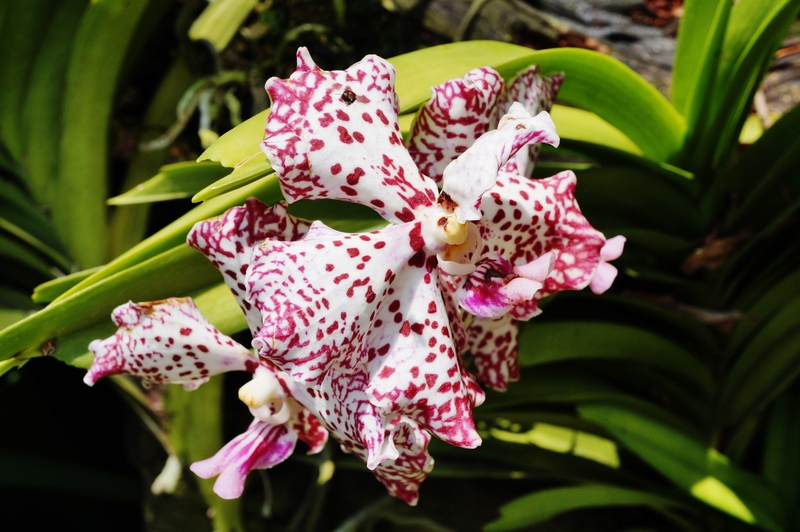Earth's Fertility Boosted by Organic Waste
Posted on 01/09/2025
Earth's Fertility Boosted by Organic Waste: A Comprehensive Overview
Organic waste has been both a glaring environmental challenge and an untapped resource for the enhancement of soil fertility across the globe. Transforming what was once considered mere "garbage" into potent nutrients, this sustainable practice is already revolutionizing agriculture and the state of earth's soil health. This in-depth article explores how organic waste boosts the fertility of the earth, the science behind the process, its environmental and economic implications, and best practices for harnessing this green solution.

Understanding Organic Waste and Its Role in Soil Fertility
Organic waste refers to biodegradable materials originating from plants or animals. This includes:
- Food scraps (vegetables, fruits, bread, etc.)
- Yard trimmings (grass clippings, branches, leaves)
- Animal manure
- Paper products (unbleached, not treated with chemicals)
When processed through natural decomposition or composting techniques, these materials break down into rich organic matter. This process:
- Returns essential nutrients to the soil
- Improves soil structure and water retention
- Encourages beneficial microbe activity in the soil
The Fertility Connection: How Does Organic Waste Enrich Soil?
Earth's natural fertility is directly boosted by the conversion of organic waste into humus. Here's how it happens:
- Decomposition - Microbes and earthworms break down organic matter into smaller, absorbable components.
- Nutrient Cycling - Nutrients like nitrogen, phosphorus, potassium, and carbon are released, supporting plant growth.
- Soil Structure Enhancement - The addition of organic material improves soil aeration, water retention, and reduces compaction.
- Boost in Biological Activity - An abundance of microorganisms ensures a healthier, more fertile soil ecosystem.
Benefits of Organic Waste Utilization for Earth's Fertility
Applying organic waste to soil contributes not only to enhanced crop yields but also fosters numerous secondary benefits:
- Reduces reliance on chemical fertilizers, which can degrade soil over time
- Improves soil health naturally and sustainably
- Prevents pollution by diverting waste from landfills
- Decreases greenhouse gas emissions associated with chemical farming
- Supports biodiversity by nurturing earthworms and soil microbes
Environmental Impact of Organic Waste-Based Fertility
The environmental impact of using organic waste to rejuvenate soil is significant and overwhelmingly positive:
- Lowered methane production: Organic waste in landfills emits methane. Composting or recycling this waste dramatically cuts those emissions.
- Carbon sequestration: Soils rich in organic matter can absorb and hold more carbon, combating climate change.
- Cleaner waterways: Healthy, organic-enriched soils filter runoff, reducing water pollution.
Types of Organic Waste Used to Enhance Soil Fertility
There are several forms of organic waste known to boost soil fertility, including:
- Compost: Decomposed plant and food scraps, transforming waste into a brown, crumbly soil amendment
- Green manure: Fresh plant material plowed into soil to add nutrients directly
- Animal manure: Adds vital nutrients and increases soil's moisture-holding ability
- Crop residues: Stalks, leaves, and husks left over after harvest help nourish soil when incorporated
The Science Behind Soil Fertility Boost from Organic Waste
Decomposition: Nature's Recycling Process
When organic waste is introduced to the soil, decomposition takes over. This is a natural process led by microorganisms such as bacteria, fungi, and earthworms. These hardworking life forms break down waste into basic nutrients, simultaneously releasing energy and creating humus--a key ingredient in fertile soil.
Soil Microbial Activity: The Hidden Workforce
The presence of organic waste stimulates microbial growth. Bacteria and fungi, for example, are responsible for converting raw materials into forms that plants can easily absorb. This not only means improved nutrient availability but also a healthier soil food web, making the earth more resilient and productive.
Organic Waste and Soil Structure
By increasing the percentage of organic matter in soil, organic waste:
- Reduces erosion by binding soil particles together
- Improves moisture retention, which is crucial in drought-prone regions
- Enhances root penetration--plants grow deeper, healthier roots for better nutrient access
Transforming Organic Waste into a Soil Fertility Resource
There are several proven methods to turn organic waste into a soil fertility booster:
Composting
This age-old practice involves creating controlled conditions (air, moisture, balanced carbon to nitrogen ratios) to accelerate the breakdown of organic matter. Composting can be done at any scale--from backyards to mega municipal programs--turning kitchen scraps and yard waste into nutrient-rich compost that nourishes the earth.
Vermicomposting
Utilizing earthworms to process organic waste, vermicomposting creates fine, highly potent "worm castings" loaded with readily available minerals for plants. This technique is celebrated for its speed and the superior quality of fertilizer produced.
Anaerobic Digestion
This method uses bacteria in oxygen-free environments to convert waste into biogas and a digestate, which is a valuable soil amendment. Anaerobic digestion addresses both waste management and energy needs, delivering fertility-boosting by-products for the earth.
Best Practices for Applying Organic Waste to Soil
- Balance carbon and nitrogen inputs: Mix green (nitrogen-rich) and brown (carbon-rich) materials to promote effective decomposition.
- Monitor moisture and aeration: Compost piles and amended soils should be moist, but not waterlogged, and mixed to allow oxygen flow.
- Apply at the right time: Add compost or organic fertilizers before planting and during the growing season for optimal results.
- Avoid contamination: Use only organic waste free from pesticides, plastics, or hazardous chemicals to ensure safe, healthy soils.
Challenges and Solutions in Using Organic Waste for Earth's Fertility
Common Obstacles
- Collection and separation: Municipal and farm-level waste streams often include non-biodegradables which hinder composting.
- Odors and pests: Poorly managed organic waste can trap unpleasant smells and attract unwanted insects or animals.
- Pathogens and weed seeds: Insufficient composting can spread diseases or invasive plants if waste is not fully "finished."
Innovative Solutions
- Community composting programs: Foster local infrastructure and education to ensure waste is collected and processed efficiently.
- Advanced composting technologies: Aerated piles, in-vessel composters, and high-temperature methods reduce risks and speed up decomposition.
- Public policy and incentives: Encourage waste diversion from landfills through legislation and support for organic recycling initiatives.
Global Success Stories: Organic Waste Enriching Earth
From small farms to urban environments, countries worldwide are already reaping the rewards of using organic waste for soil fertility.
- India: Large-scale adoption of composting and vermicomposting has revitalized degraded soils, boosted food production, and provided extra income for farmers.
- European Union: Policies supporting organic waste recycling and compost application on farms have improved soil resilience to climate change.
- United States: Municipal composting facilities process millions of tons of organic waste, reducing landfill pressure and returning nutrients to local farms and gardens.
Organic Waste and Circular Economy: The Sustainable Path Forward
In a truly sustainable system, organic waste closes the loop from farm-to-table and back again. By prioritizing processes that return all natural "waste" to the earth, societies can reduce dependence on synthetic fertilizers, slash carbon emissions, and regenerate the planet's soils over the long term.
- Less landfill waste: Diverting organics helps cities manage waste more sustainably.
- Resource conservation: Recycling nutrients preserves diminishing natural resources, such as phosphate rock.
- Local economic growth: Composting industries create jobs and supply valuable products for regional agriculture.
How You Can Help Boost Earth's Fertility with Organic Waste
Everyone has a role in returning valuable resources to the earth. Here's how individuals, businesses, and communities can get started:
- Compost at home: Even a small pile in the backyard, or a kitchen countertop bin, can divert hundreds of pounds of organic waste annually.
- Support local composting initiatives: Advocate for municipal curbside organic waste pickup and processing.
- Purchase organic soil products: Encourage stores, farms, and landscapers to use and sell compost and organic fertilizer derived from recycled waste.
- Educate others: Share the science and benefits of organic waste recycling to promote broader community engagement.

Conclusion: Unlocking Earth's Natural Fertility Through Organic Waste
The power to boost earth's fertility with organic waste is at our fingertips. By viewing food scraps, yard waste, and other organics as valuable fertility resources--not merely as trash--we can regenerate the planet's soils, produce healthier food, and build a sustainable future.
This circular approach revitalizes the very foundation of agriculture, ensuring that the earth's growing population can be fed without degrading the environment. The journey to sustainable prosperity starts with every peel, stalk, and leaf returned to the soil.
FAQs on Organic Waste and Soil Fertility
- What types of organic waste are best for soil fertility?
Kitchen scraps, garden trimmings, crop residues, and untreated paper products are all excellent choices. Manure also offers substantial nutrient value. - Is composting better than using chemical fertilizers?
Yes, composting organic waste adds multiple benefits such as healthier soil structure, improved biodiversity, and no risk of chemical runoff. - How long does it take for organic waste to benefit soil?
Most compost is ready in 2-6 months, depending on the method. Benefits are visible within one growing season. - Can everyone participate in organic waste recycling?
Absolutely. Individuals, households, and businesses can all play a crucial role in collecting, composting, and applying organic waste to boost earth's fertility.
Earth's fertility enhancement through organic waste is an eco-friendly, economically sensible, and scientifically proven solution. Harnessing this natural process will secure a more resilient, bountiful future for all.

